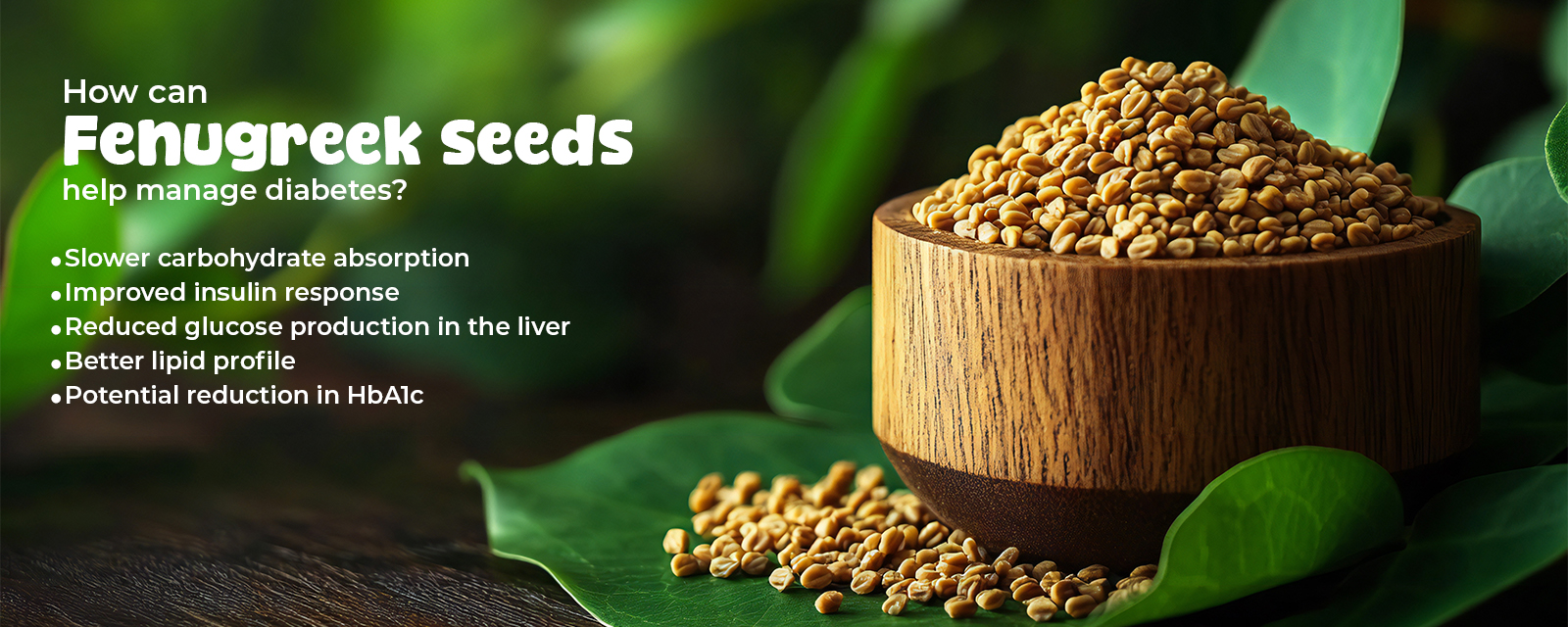
In India, around 89.8 million adults are living with diabetes, constantly worrying about their blood sugar.
Though there are credible and effective medications to help people live peacefully while dealing with diabetes, there’s a simple kitchen remedy that can actually help you stabilize your blood sugar.
Methi dana or fenugreek seeds have been used as a spice for thousands of years in India.
In this blog, we dig into the science behind fenugreek seeds and their amazing benefits for your heart.
What are fenugreek seeds?
Fenugreek seeds are tiny, golden-brown seeds that come from the Trigonella foenum-graecum plant, leaves of which are also consumed as leafy greens.
Methi has a slightly bitter taste, which is used in a variety of Indian, Middle Eastern, and Mediterranean cuisines.
Fenugreek Seeds: Nutritional Information (per 1 tbsp / 11 g)
| Nutrient | Amount |
|---|---|
| Calories | 35 kcal |
| Fiber | 3g |
| Protein | 3g |
| Iron | 1 mg (approx. 6–7% DV) |
| Carbohydrates | 6g |
| Magnesium | 21 mg (approx. 5% DV) |
| Manganese | 0.1 mg (approx. 5% DV) |
| Calcium | 20 mg (approx. 2% DV) |
| Potassium | 85 mg (approx. 2% DV) |
It is a rich source of soluble fiber, plant proteins, and bioactive compounds like saponins and diosgenin.
The mix of such nutrients gives methi dana potential benefits for diabetes, heart disease, digestion, and even cholesterol regulation.
Having soaked fenugreek in the morning, on an empty stomach, can be a promising natural strategy for managing diabetes and dyslipidemia”. (1)
How can Fenugreek seeds help manage diabetes?

The soluble fiber in methi dana forms a gel in your gut lining, slowing digestion and blood glucose release, so your blood sugar doesn’t spike rapidly.
This can help you manage post-prandial blood glucose, which is great deal of relief in type 2 diabetes. (2)
Fenugreek seeds can also improve the cells’ response to insulin with a compounds like 4-hydroxyisoleucine.
One research showe methi seeds have potential in protecting your cardiac structure by reducing oxidative stress in diabetic rats. (3)
In heart disease patients, gluconeogenesis (making of glucose in liver), which is often overactive.
Methi seeds can help lower the speed of this process and may provide relief in long run.
The soluble fiber in methi seeds forms a gel-like substance in your digestive tract and binds to bile acids & cholesterol encourages your body to pull LDL (the “bad” cholesterol) from the bloodstream to make new bile
This helps lower the current LDL levels and build a better lipid profile over time.
Consistently having soaked methi seeds can help improve glycemic markers like HbA1c, though yeah, this isn’t replacing your medication and lifestyle choices. (4)
In short: if you’re dealing with diabetes or other heart diseases, fenugreek seeds might help push the needle a little in your favour.
How to use fenugreek seeds?
Simply soaking 1 to 2 tablespoons of fenugreek seeds and consuming the water+seeds before breakfast.
Keep chewing the seeds to extract the beneficial nutrients. You can have half in the morning and half in the evening.
Limitations & cautions:
Fenugreek seeds are not the substitute for standard diabetes medications, which are absolutely required.
It is important to consult your healthcare professional if you’re on glucose-lowering medications as adding fenugreek seeds could (in rare cases) push blood sugar lower than intended.
Some people might face mild gastrointestinal issues as methi seeds have warming effects. So managing expectations is key.
Conclusion:
In a world full of complicated health claims, the story of fenugreek seeds might provide some relief with its natural benefits.
There’s a growing body of research showing modest but meaningful benefits for diabetes management and heart disease risk reduction.
When used wisely, along with diet and exercise, one can aim for healthier blood sugar, better lipid profile, and a stronger heart.
Explore more from Naturopedia:
Lakadong Turmeric Benefits Explained: High-Curcumin Spice to Boost Immunity, Gut & Joint Health
Top 10 Natural Health Boosters to Add to Your Daily Routine (Backed by Science)